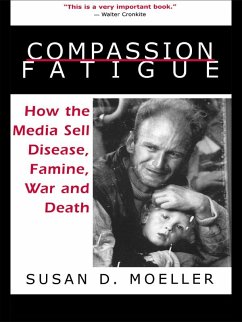From outbreaks of the flesh eating viruses Ebola and Strep A, to death camps in Bosnia and massacres in Rwanda, the media seem to careen from one trauma to another, in a breathless tour of poverty, disease and death. First we're horrified, but each time they turn up the pitch, show us one image more hideous than the next, it gets harder and harder to feel. Meet compassion fatigue--a modern syndrome, Susan Moeller argues, that results from formulaic media coverage, sensationalized language and overly Americanized metaphors. In her impassioned new book, Compassion Fatigue, Moeller warns that the American media threatens our ability to understand the world around us. Why do the media cover the world in the way that they do? Are they simply following the marketplace demand for tabloid-style international news? Or are they creating an audience that as seen too much--or too little--to care? Through a series of case studies of the Four Horsemen of the Apocalypse--disease, famine, death and war--Moeller investigates how newspapers, newsmagazines and television have covered international crises over the last two decades, identifying the ruts into which the media have fallen and revealing why. Throughout, we hear from industry insiders who tell of the chilling effect of the mega- media mergers, the tyranny of the bottom-line hunt for profits, and the decline of the American attention span as they struggle to both tell and sell a story. But Moeller is insistent that the media need not, and should not, be run like any other business. The media have a special responsibility to the public, and when they abdicate this responsibility and the public lapses into a compassion fatigue stupor, we become a public at great danger to ourselves.
Dieser Download kann aus rechtlichen Gründen nur mit Rechnungsadresse in A, B, BG, CY, CZ, D, DK, EW, E, FIN, F, GR, HR, H, IRL, I, LT, L, LR, M, NL, PL, P, R, S, SLO, SK ausgeliefert werden.









